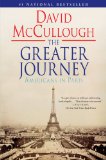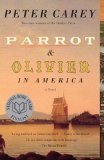Summary | Excerpt | Reviews | Beyond the book | Read-Alikes | Genres & Themes | Author Bio

Great Minds, the Gilded Age, and the Triumph of Evolution in America
by Barry WerthIn Banquet at Delmonico’s, Barry Werth, the acclaimed author of The Scarlet Professor, draws readers inside the circle of philosophers, scientists, politicians, businessmen, clergymen, and scholars who brought Charles Darwin’s controversial ideas to America in the crucial years after the Civil War.
The United States in the 1870s and ’80s was deep in turmoil–a brash young nation torn by a great depression, mired in scandal and corruption, rocked by crises in government, violently conflicted over science and race, and fired up by spiritual and sexual upheavals. Secularism was rising, most notably in academia. Evolution–and its catchphrase, “survival of the fittest”–animated and guided this Gilded Age.
Darwin’s theory of natural selection was extended to society and morals not by Darwin himself but by the English philosopher Herbert Spencer, father of “the Law of Equal Freedom,” which holds that “every man is free to do that which he wills,” provided it doesn’t infringe on the equal freedom of others. As this justification took root as a social, economic, and ethical doctrine, Spencer won numerous influential American disciples and allies, including industrialist Andrew Carnegie, clergyman Henry Ward Beecher, and political reformer Carl Schurz. Churches, campuses, and newspapers convulsed with debate over the proper role of government in regulating Americans’ behavior, this country’s place among nations, and, most explosively, the question of God’s existence.
In late 1882, most of the main figures who brought about and popularized these developments gathered at Delmonico’s, New York’s most venerable restaurant, in an exclusive farewell dinner to honor Spencer and to toast the social applications of the theory of evolution. It was a historic celebration from which the repercussions still ripple throughout our society.
Banquet at Delmonico’s is social history at its finest, richest, and most appetizing, a brilliant narrative bristling with personal intrigue, tantalizing insights, and greater truths about American life and culture.
Ultimately, Banquet at Delmonico's is worth reading because it narrates in a compelling way a struggle so eerily similar to the one unfolding before our eyes at this very moment. Behind each successive debate over bailing out financial institutions or sealing our national borders there is a social philosophy – a set of ideas that dictates what society is "really like" and how it should be governed. What better way to get a fresh take on the current competition of social ideologies than by reading about how it played out a hundred years ago?..continued
Full Review
 (574 words)
(574 words)
(Reviewed by Micah Gell-Redman).
It may seem that the concept of globalization is a very new one, and that
the growth of free trade and its accompanying controversy belong to our era
alone. In fact, the 1860s saw an explosion of trade between nations, accompanied
by a doctrine of free markets unbridled by government intervention. Unlike
today, though, many of the free marketeers of this earlier era were willing to
apply their logic outside the realm of economics, to human societies and to
human beings themselves.
These are the Social Darwinists (sometimes called Social Positivists) whose
thinking stood behind the great economic expansion, was challenged by a global
recession, and ultimately fell out of favor in the United States when the
princely ...

If you liked Banquet at Delmonico's, try these:

by David McCullough
Published 2012
The Greater Journey is the enthralling, inspiring - and until now, untold - story of the adventurous American artists, writers, doctors, politicians, architects, and others of high aspiration who set off for Paris in the years between 1830 and 1900, ambitious to excel in their work.

by Peter Carey
Published 2011
From the two-time Booker Prize–winning author comes an irrepressibly funny new novel set in early nineteenth-century America.